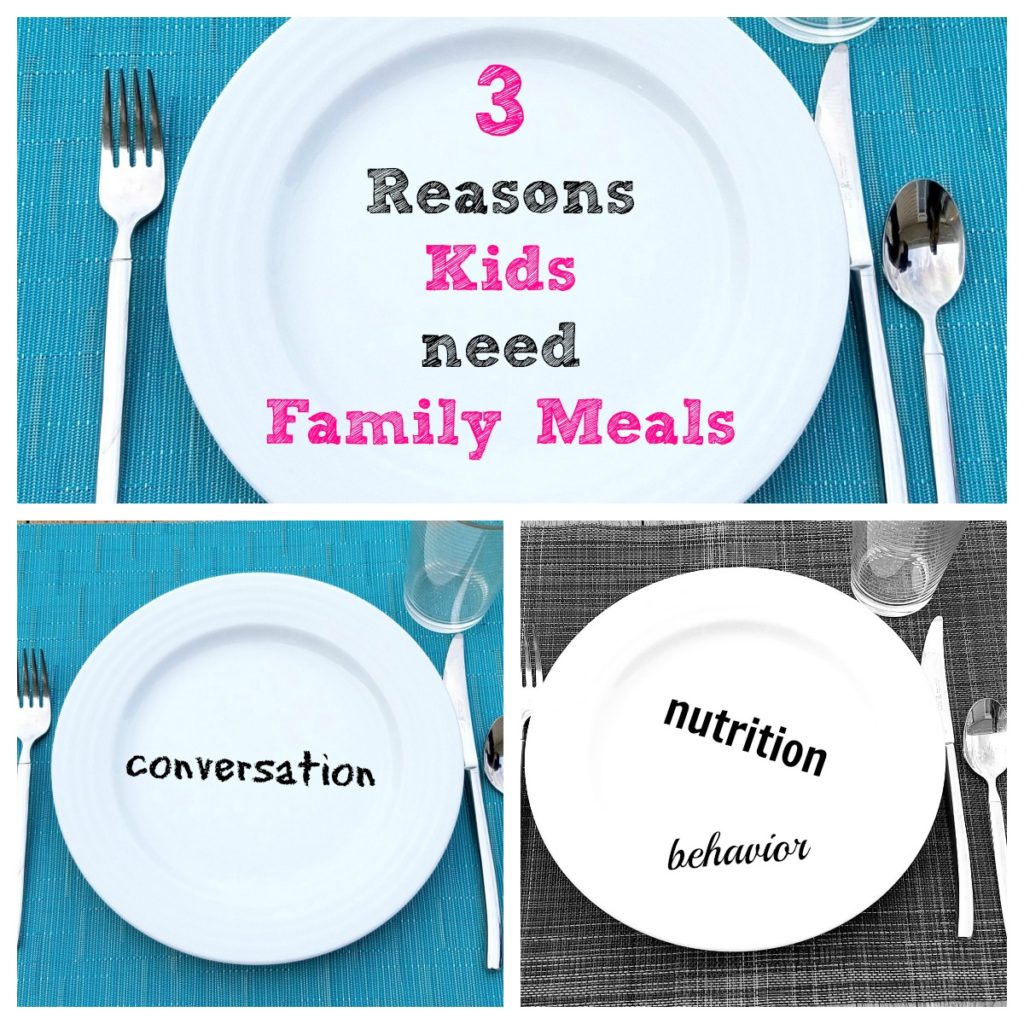
Family Meals Matter
Want to give your kids a boost in life? Then sit down at the table and eat together as a family more often. At least three family meals together every week provides benefits that will last a lifetime. That’s right – just three. You don’t even need to eat together every single day like my childhood friends did – they grew up on farms and daily family dinners were as much a priority as feeding the cows and pigs. Three ways your kids get a boost:
- Better Behavior and Development
*Higher grades and better academic performance
*Higher self-esteem and greater resilience
*Greater sense of security and connection within the family
*Have a closer relationship to parents and siblings
*Greater understanding and acknowledgment of boundaries and expectations set by parents
*More likely to follow those boundaries and expectations
*More likely to exhibit positive social behaviors such as respect, sharing and fairness
*Less likely to show symptoms of depression, violence and suicide
*Better able to resist negative peer pressure
*Decrease in high-risk behaviors such as drug use, smoking, sexual activity and delinquent acts
*Lower risk of teen pregnancy
*Less likely to develop disordered eating behaviors
Frequent family meals provides connection and fosters emotional balance with your children and teenagers. Three family meals every week is all it takes – the benefits increase even more with each additional family meal.
- Healthier Eating Habits
*Healthier eating patterns overall
*Higher consumption of fruits and vegetables
*Higher intake of nutrients needed for proper growth such as protein, calcium and numerous vitamins and minerals.
*More likely to maintain a healthier weight/weight range
*Less likely to have eating disorders and disordered eating
Every meal your family eats together is an opportunity for your kids to learn from YOU – their role model for lifelong food habits – about the importance of regular meals and balanced choices. You can teach them how to have a positive and loving relationship with food, rather than a negative and fear-filled one. You can teach them table manners, too, like napkins on your lap, not chewing with your mouth open and not talking with food in your mouth. You KNOW those will serve them well down the road in social situations.
- Conversation Skills
*Greater ability to be an active listener and participant in meaningful conversations
*Enhanced language development
*More likely to have expanded vocabulary
*Better able to express their own opinions and have active voice within the family
In spite of all the technology today, your kids still need to learn how to actually carry a conversation. Meaningfully. Longer than just one sentence. Sitting at the dinner table together gives them this opportunity.
Notice I said sitting at the table. Sitting on the couch or floor in the living room every night with the TV blaring – even as a family – is not the type of togetherness that creates positive outcomes with behavior and conversation. A calm and pleasant environment is best, so smart phones and mobile devices should be off, too.
Sample “conversation starters:”
*What’s the funniest/strangest/best thing that happened to you today?
*What’s your perfect day? What would you do and who would be with you?
*Name two places you’d like to go for family summer/winter vacation and why.
*What famous person(s) do you respect and admire? And why?
*If you were principal of your school, what would you do different?

How to Get Started Eating More Family Meals
*Decide you value eating meals together.
*Make it a family priority.
*Every Sunday, discuss which three meals that week you’ll all eat together. Yes, we’re all crazy busy with work, school, after-school activities, volunteer and community activities. But if you value this family time, you’ll figure out what days and times work. It can be breakfast, lunch or dinner. My childhood farmer friends also enjoyed big Sunday midday meals with extended family. Friends, too. That’s how I know about their tradition!
*Get input from everyone on what to eat/serve. Always include foods you know your kids like, but also be adventurous with new foods.
*Create fun theme nights, like Italian, Mexican, Asian, pasta, soup + salad, cheesy comfort food night. Maybe even breakfast for dinner night with eggs, bacon, sausage and biscuits. Or my favorite – leftovers night. Great way to teach how to enjoy leftovers and cut down on food waste.
*Get everyone involved in shopping, meal prep and clean-up. Even more lifelong skills and lessons plus expanded family time.
*Never lose sight of the fact that family meals are one of the best things you can do to help your kids grow into healthy, happy adults.
Disclosure: As a proud supporter of Indiana Agriculture and Farmers, I’m happy to mention this is a sponsored post for The Glass Barn. All content/opinions created solely by me. The Glass Barn is a physical and online resource providing educational materials on Indiana farming to educators and students; it’s funded by the soybean checkoff. You can visit the Glass Barn at the Indiana State Fairgrounds.
Resources for scientific research and statistics supporting family meals: American College of Pediatricians, Academy of Nutrition & Dietetics, Cornell University Food & Brand Lab, Food Marketing Institute, Bell Institute of Health & Wellness, Numerous University Extension Agencies and the Journal of Pediatric Health)